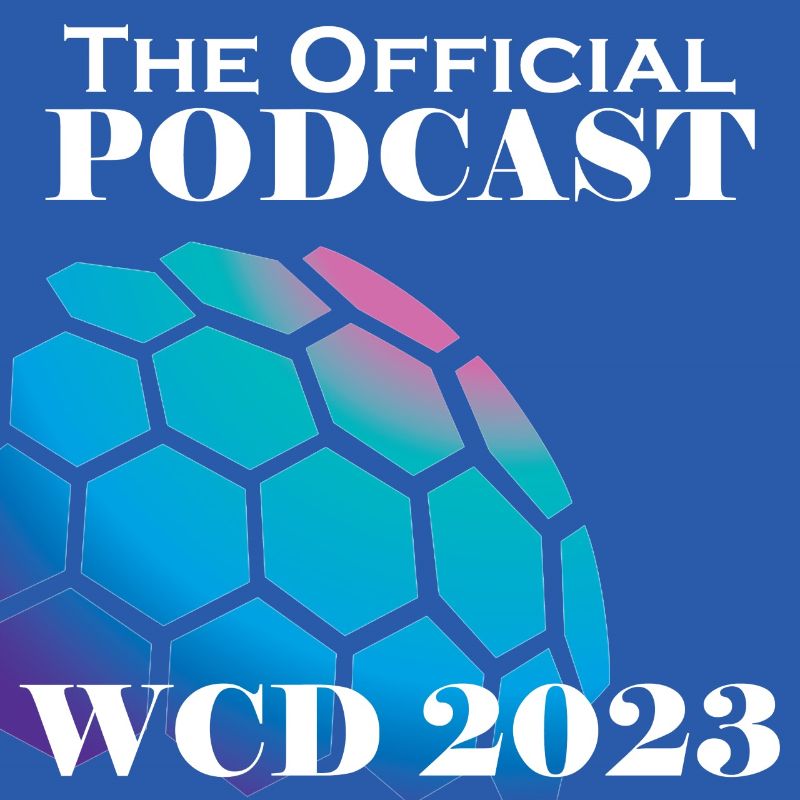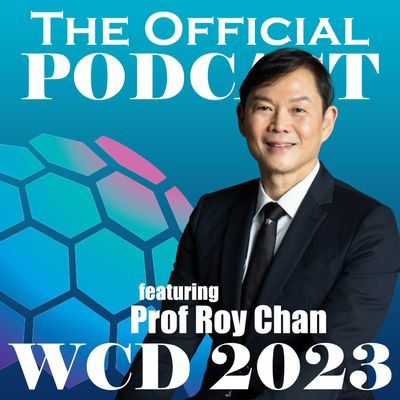From the Podcast of the 25th WCD

Episode 24 – Mental Health in the Derm Clinic; and a check in with Prof Roy Chan on WCD 2023 preparations.
Etienne.Hi, this is the official podcast of the WCD, that is the world Congress of dermatology, which will be held next in Singapore in 2023. I am Dr. Etienne Wang from the National Skin Center of Singapore and I will be a host for this podcast. You can listen to us on Apple Podcast, Spotify, Pocketcast and wherever else you get your podcast!
In this podcast I speak with dermatologists and skin researchers from all over the world to talk about all things dermatology. This episode is the last episode of our second season, and I have professor Roy Chan coming back in the second half of the show to talk about WCD preparation so far. But now I’d like to introduce a new cohost, Lester, to WCD podcast team. Lester is a final year resident here in Singapore and he’ll be giving us a Derm topic for discussion this week. Welcome Lester, hi!
Lester.Hi. Hi, Etienne, very nice of you to invite me to speak on this platform.
E. Okay. So, what’s on your mind about dermatology this week?
L. I think that in the recent years, I would say that there’s a lot more emphasis on mental health associated with patients who suffer from skin diseases and I would say that it’s about the right time that we start paying attention to these small things as we don’t usually do so in clinic.
E. Yes, absolutely. Can you elaborate a little bit more?
L. Well, I think that one of the most recent papers that have come across are the associated burden of mental health conditions in patients with alopecia areata. It was a population-based study in the UK that was published in the BJD not too long ago. They compared patients who suffered from AA with matched controls and found that they had a much-increased rate of getting depression, anxiety, and all that actually translated to more time off work and eventually even unemployment. So, things like alopecia areata, that we think are very much just diseases of cosmesis, is actually causing a lot of problems.
E. Yes, and not only alopecia areata. Any form of hair loss can cause a lot of psychological distress and we don’t have to talk about alopecia areata alone, plenty of studies for psoriasis, atopic dermatitis, all the other inflammatory conditions that it can also cause distress in patients.
L. Definitely so. There was yet other paper on the annal of translational medicine that actually looked at hidradenitis suppurativa and the psychiatric comorbidities that these patients actually experience and they found that these patients had not only more rates of anxiety, depression, but it actually translated to increased rates of suicides, substance abuse, things that I wouldn’t have thought of to be significant. And I guess all these papers have actually taught me to be a little bit more discerning to look up for our patient’s mental health to in fact, even just ask them the question: “Hey, how have you been coping”? I think these are things that I’ve learned from all these papers.
E. When you talk about mental health in skin diseases, there are two ways it can affect: one is at the skin disease primary and it causes the mental health issues secondarily or sometimes a primary mental health issues made worse by having a skin condition. How do you think you can differentiate between these two?
L. I think the most important thing is to recognize that at this point in time, we’re still not sure which came first, the psychiatric disease or the skin dermatosis.
So, in our context, I would say that for any patient who seems to complain of a particular disease that we ourselves may suddenly perceive may not be of a big deal, don’t brush off their concerns, actually find out how much it affects their lifestyle. One of the recommended methods that was suggested in a paper on Jama Dermatology was to actually consider asking a simple patient health questionnaire, which involves only two questions: the first question being that of over two weeks does the patient find himself or herself having little interest or pleasure in doing the things that he or she usually likes and over two weeks, did they feel down or depressed or hopeless?
This questionnaire can actually give us a very immediate way of screening for patients who actually potentially might be depressed, who don’t show it.
I wanted to just share the last point on this very interesting research: they found that patients with anxiety and depression, even in the absence of dermatosis, they seem to have an elevated or rather hyperactive Th-17 pathway. This pathway should be something very familiar to us because it has been implicated in psoriasis and the pathogenesis and the Interleukin 17 has been a target that we use quite commonly in terms of blockade. So, I wonder whether or not one day, if our patients do have mental disorders associated skin disease, perhaps would the interleukin 17 inhibitors eventually become a form of treatment for these patients, for their mental disorders.
E. It’s quite an interesting hypothesis. This is whole field of psycho neuro immuno dermatology now, which I think if you Google, you’ll find quite a number of papers so I think you’re absolutely right. I think we have to treat the patient as a whole being and sometimes, we need to take into account the mental health as well, and maybe a Th-17 biologic will actually help improve the mood of some of our very severe patients.
L. Yes, indeed. I’m looking forward to the day where we have trials that demonstrate that these IL-17 inhibitors not only help with the skin, but perhaps help if the patient’s mental health, then that way we can say that we’re not only dermatologists, but we also become well-rounded physicians who take care of our patients in all aspects.
E. Yes. I just want to go back to something that you’ve mentioned earlier: you have this very simple-to-apply two-point questionnaire: if you do happen to pick out a patient who is depressed or anxious or feel hopeless about their skin condition, what would the next step be?
L. I think the realistic thing to do in clinic is to recognize the problem, share with the patient that there might be a problem and refer the patient to a mental health specialist who might be able to help them out. I can’t say that we are experts at knowing what to do next, when our patients get depressed and anxious, so perhaps if a mental health specialist can help, it will be great while we fix the skin and someone else takes care of their mental health.
E. Yeah. Or an in-house kind of a mental health specialist, sometimes we can even refer to the social worker or maybe even at the clinical psychologist who comes visiting once a month or something like that. That would be a huge boom to any center.
L. Definitely so!
E. Yeah. All right. Well, thank you Lester, that was very interesting!
Thank you again for joining the team and I hope to speak to you when season three comes around!
L. All right. Looking forward to your invite.E. Okay. Bye bye Lester!

And now I’d like to welcome back to the podcast professor Roy Chan, president of the 25th World Congress of Dermatology 2023.
Welcome Prof Chan back to the podcast!
RC. Thank you. Thanks for asking me back again!
E. Yes. I thought this would be a good time to ask you back to check in on how things are going with the Congress. How has preparations been so far?
RC. I think, all things considered, we are doing extremely well!
Since the last I spoke with you on the podcast, we have settled a lot of things: we have confirmed several issues, the most important being that it will be a face-to-face meeting, in person meeting, there is no change to the dates, the venue is going to be the same, Suntec convention and exhibition center in Singapore and the planning for the various aspects of the conference, which include the scientific content as well as the logistics and the social content proceeding very well.
E. Can you give us a taste of what is going to be on the menu for the scientific program?
RC. It is going to be a very, very deep and broad scientific program. It will cover all aspects of dermatology: starting with the top, which is 15 keynote talks by the outstanding experts in their own area of expertise. There will be five distinguished speakers: distinguished speakers are traditionally non-dermatologists, so they could be scientists or other thinkers.
We have five distinguished speakers and together they make up the plenary sessions. Then we come to the meat of the meeting, which is the symposia. In this edition symposia will cover 60 topics and span over 200 sessions, so for each topic there will be several sessions.
The sessions will cover almost every aspect of dermatology and be very deep as well as wide.
In addition to that, there are other types of sessions we’ll have: for the first time, we are going to introduce a debate style, Oxford style debate, on controversial statements.
We will have a speaker speaking forward and one speaking against and a facilitator, and there will be eight of these topics, it is going to be two per day for the first four days.
In addition, there will be 24 courses: these courses are meant for persons who may not be very familiar with the topic and want to have a thorough grounding of it. They will range from surgery, to etiopathology and to a variety of other things. Most of the 24 will be half-day courses, there are a couple which are full day courses and there will be a small nominal charge to attend.
There are going to be 18 expert forums which will be run by a panel of experts who are going to have a lot more time to discuss amongs themselves and also take field questions from the audience and they will speak about newer things, updates, more controversial aspects and so on.
E. That sounds very exciting! Are there any topics or any fields that are new to the Congress that we haven’t seen in prior congresses?
RC. The interest and the focus in dermatology has recently shifted towards the Jak/Stat inhibitors, the new treatment regiments of AD, certainly the alopecia areata and vitiligo, melanomas, they will feature very highly in this but at the same time we have not at all neglected important global dermatology topics and, being the world dermatology congress, we want to ensure that conditions which are affecting many of the less developed countries and less developed communities are not forgotten and are well covered. We also have the abstract driven sessions, which leads me to to the fact that our abstracts are open for submission, o please send in your abstract ASAP!
We will have abstract driven sessions covering 40 topics, and these will eventually end up either as posters or as oral presentations.
E. I understand that the ILDS board just had a visit to Singapore, can you tell us how that visit went?
RC. It went very well!
There wasn’t a board, it was just the executive committee. There were six of them plus the senior staff of the ILDS and the team of Triumph Group International, which are our PCO (Professional congress organizers).
All went very well, they visited the Suntec Convention Center as well as the Pan Pacific hotel, which is the main HQ hotel. I’m very pleased with the facilities and what looks like going to be an extremely well-run conference.
They loved the city, some of them have never been to Singapore, so they were quite mesmerized by what’s happening in Singapore, even during the COVID they had a positive experience and were complete impressed by Changi airport for example.
It would be remiss of me not to talk about the Singapore and regional sessions, which are going to be very important: they are going to occupy the first 45 minutes of every day.
It is going to be six tracks every morning, there will be one track per room and it is going to feature various aspects of Singapore and regional dermatology, from subspecialties to how we work with NSC and SRIS from the point of view of transactional research.
We are going to have sessions for the league of ASEAN dermatological societies, we are going to have sessions for patient support groups and advocacy, and, finally, other aspects of dermatology which have not been covered before: value driven care, migrant care, dermatology, tele dermatology, imaging, and so on. Very thorough, and this is going to focus on the regional colleagues now, local experts.
E. Many more conferences in from now until the Congress itself, what presence will the WCD committee have in the upcoming conferences?
RC. There is not that much time left, it is barely a year, and the face-to-face meetings are just recently opening up.
We have recently come back from CILAD and the next meetings are going to be the EADV in Milan in September and there will be the Indonesian National Conference in Semarang, in Java, in September. There is going to be the American Dermatological Association in Canada in October. There is going to be the World Skin Summit, which is organized by the ILDS in Lima, Peru, and we will have a presence there. Going forward from the region there is going to be the Indo-China meeting in Phnom Penh in early December, and this is all for this year.
Next year obviously there is the AAD which is going to be in March in New Orleans. There is going to be a very big Indian meeting, the in IDDL meeting in Mumbai and we will definitely have a presence there as well, and so and so forth.
We are very happy to be able to resume face to face promotions and meeting people again and we really need to get the message out.
E. Yes, and I would also like to remind everyone that registrations and abstract submissions are open, and you can find this on our website at www.wcd2023singapore.org.
Thank you so much Prof. Chan for coming on a podcast again to tell us about how things are going. I think things seem to be on track for a very exciting conference!
RC. Thank you very much, we hope, so fingers crossed!
E. Okay. Well, thank you very much!
RC. Bye!
E. Thank you for joining us on another episode of the offshore podcast at the WCD!
Don’t forget to follow us on Facebook, Instagram at @wcd2023singapore, and check out the WCD website, www.wcd2023singapore.org for more updates and content on the WCD.
At that website you can find links to register for the WCD and submit your abstracts for next year’s WCD.
And until next time, stay safe and use sunblock!














